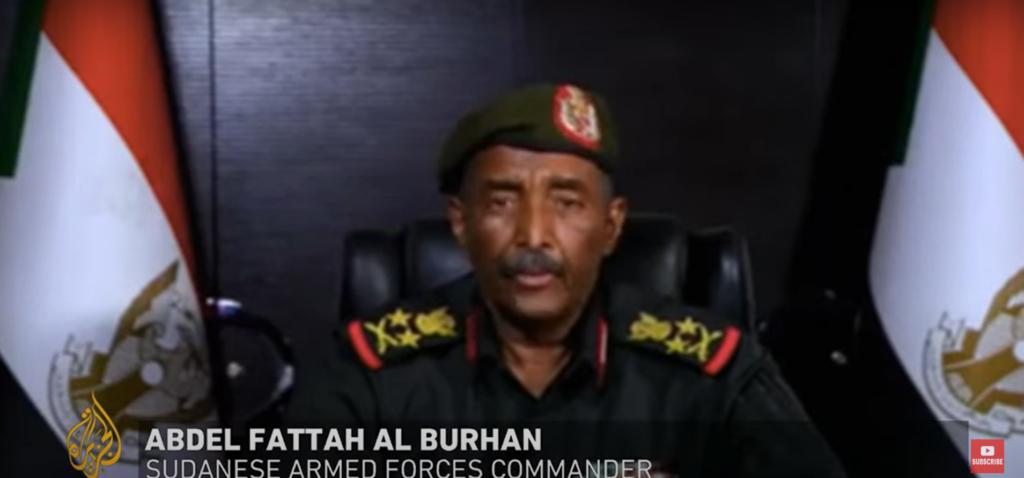The fighting in Sudan continues without a resolution for more than a week in the capital Khartoum, the fighting broke out on April 15 against the background of deep differences of opinion regarding the integration of the Rapid Support forces(RSF) of Mohamed Hamdan Dagalo, known as “Hemedti” in the Sudanese army, as stipulated in the emergency agreement signed by both parties with the political forces in the country, to end the crisis that erupted following the coup by the Sudanese army and the Rapid Support Forces against the civilian government in October 2021.
Sudan has entered a state of security chaos and the military battle is raging between the forces of General Abdel fatah Al-Burhan, the army commander and the de facto ruler of Sudan since the coup in 2021, and the second man in power, Muhammad Hamdan Dagalo Hemedti, the commander of the Rapid Support Forces, the fightings between them is on the route of escalation.
Al-Burhan is the head of the Provisional Governing Council, Hemedti served as Al-Burhan’s deputy in the Provisional Council and cooperated with him in overthrowing the regime of the dictator Omar Al-Bashir in the coup in 2019.
The fighting is quickly spreading to new parts of the capital and new areas in Sudan and Darfur.
Millions of citizens are under siege and lack basic food products, the war is becoming dangerous and it could spread to countries that are close to Sudan such as Chad, South Sudan and Ethiopia.
Egypt supports Al-Burhan, while the United Arab Emirates supports Hemedti, the two warring parties are working to obtain weapons and military aid from various sources.
The continuation of the fighting will only further complicate the social situation in Sudan, foreign countries are interfering in the internal conflict and this may lead to the continuation of the fighting.
So far, about 20,000 Sudanese have fled from the battle zones to neighboring Chad, which already hosts about 400,000 Sudanese.
According to UN data, more than a third of Sudan’s residents are in need of humanitarian services and are suffering from hunger. It is estimated that as soon as a ceasefire is reached in the fighting, a mass exodus of Sudanese from the country will begin.
The instability in Sudan worries its neighboring countries and the continuation of the war may lead to its disintegration into small states, it has already disintegrated into Sudan and South Sudan in the past.
Since the beginning of the month, the UN has tried to pressure the two rival parties, Al-Burhan and Hemedti, to reach a framework agreement on the return to civilian rule without success, and international efforts to bring about a ceasefire have also failed.
Israel is closely following what is happening in Sudan and is concerned about the developments there.
On April 18, the Israeli Ministry of Foreign Affairs issued a statement in which it was stated that Israel is following the events in Sudan with concern, Israel wants the stability and security of Sudan, Israel calls on all parties to refrain from violence and to return to the path of internal reconciliation in order to end the process of transfer of power by broad agreement.
Both sides, General Abdel fatah Al-Burhan and Muhammad Hamdan Dagalo Hemedti supported the normalization process with Israel, therefore Israel does not take sides in the conflict between them, it wants both to reach an agreement and reconciliation in order to preserve the normalization process with Sudan.
Foreign Minister Eli Cohen visited Khartoum last February and met with General Abdel Fatah al-Burhan and the country’s political elite, with the aim of signing a peace agreement with Sudan in a few months. The parties concluded the text of the peace agreement during the visit, which received the blessing of the United States.
Officials at the Israeli Foreign Ministry said at the time that the signing ceremony is expected to take place after the transfer of power in Sudan to a civilian government, which will be established as part of the ongoing transition process in the country.
The war now in Sudan endangers Israel’s possibility of reaching a historic peace agreement with an Arab and Muslim country of strategic importance, such an agreement will open the door to the establishment of relations between Israel and other countries on the African continent.
Sudan joined the Abraham Accords already during the Trump administration in 2021, but since then no agreement has been signed between Israel and Sudan, Egypt, the Gulf countries and Morocco have also tightened relations with Sudan in a way that strengthened the regime of General Al-Burhan.
Those who are certainly satisfied with what is happening now in Sudan are Iran and the Hamas movement, Sudan, which lies on the shores of the Red Sea, was in the past a center of activity for Iran and Hamas, the Iranians established on its land a factory for the production of rockets and ammunition depots and through it transferred the different weapons to the Gaza Strip.
Israel has several times attacked targets of Iran and Hamas on the soil of Sudan, which severed its relations with Iran and imposed sanctions on the Hamas movement in order to get closer to the West.
Iran and Hamas are now satisfied with the developments in Sudan in the hope that they will be to the detriment of Israel.




